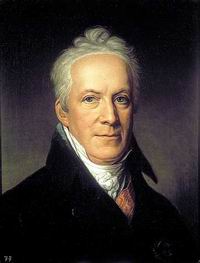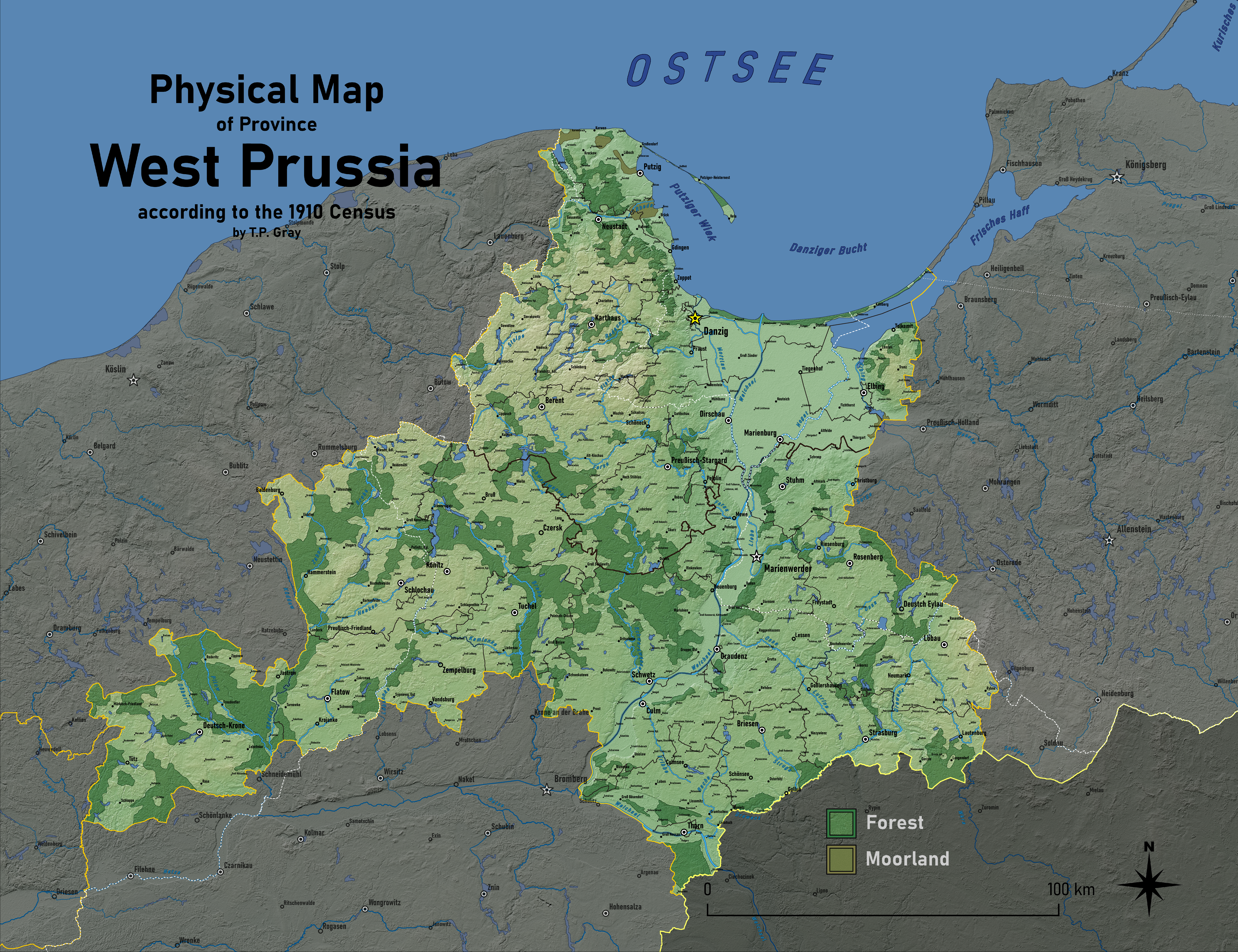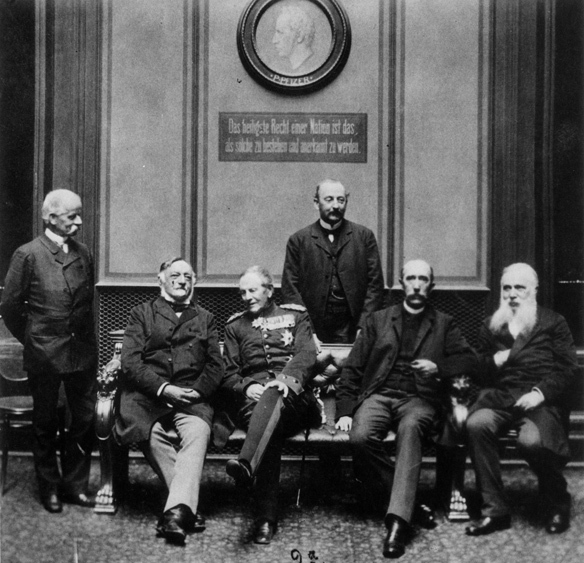|
Prussian Three-class Franchise
The Prussian three-class franchise (German: ) was an indirect electoral system used from 1848 until 1918 in the Kingdom of Prussia and for shorter periods in other German states. Voters were grouped by district into three classes, with the total tax payments in each class equal. Those who paid the most in taxes formed the first class, followed by the next highest in the second, with those who paid the least in the third. Voters in each class separately elected one third of the electors who in turn voted for the representatives. Voting was not secret. The franchise was a form of apportionment by economic class rather than geographic area or population. Members of the Prussian House of Representatives were elected according to the three-class electoral law, as were the city councils of Prussian cities and towns in accordance with the Prussian Municipal Code. After decades of controversy and failed attempts at reform, which for many caused the Prussian three-class franchise to beco ... [...More Info...] [...Related Items...] OR: [Wikipedia] [Google] [Baidu] |
Kingdom Of Prussia
The Kingdom of Prussia (, ) was a German state that existed from 1701 to 1918.Marriott, J. A. R., and Charles Grant Robertson. ''The Evolution of Prussia, the Making of an Empire''. Rev. ed. Oxford: Clarendon Press, 1946. It played a significant role in the unification of Germany in 1871 and was a major constituent of the German Empire until its German Revolution of 1918–1919, dissolution in 1918. Although it took its name from the Prussia (region), region called Prussia, it was based in the Margraviate of Brandenburg. Its capital was Berlin. The list of monarchs of Prussia, kings of Prussia were from the House of Hohenzollern. The polity of Brandenburg-Prussia, predecessor of the kingdom, became a military power under Frederick William, Elector of Brandenburg, known as "The Great Elector". As a kingdom, Prussia continued its rise to power, especially during the reign of Frederick the Great, Frederick II "the Great".Horn, D. B. "The Youth of Frederick the Great 1712–30." ... [...More Info...] [...Related Items...] OR: [Wikipedia] [Google] [Baidu] |
Hesse Nassau
The Province of Hesse-Nassau () was a province of the Kingdom of Prussia from 1868 to 1918, then a province of the Free State of Prussia until 1944. Hesse-Nassau was created as a consequence of the Austro-Prussian War of 1866 by combining the previously independent Hesse-Kassel (or Hesse-Cassel), the Duchy of Nassau, the Free City of Frankfurt, areas gained from the Kingdom of Bavaria, and areas gained from the Grand Duchy of Hesse (including part of the former Landgraviate of Hesse-Homburg from Hesse-Darmstadt). These regions were combined to form the province Hesse-Nassau in 1868 with its capital in Kassel and redivided into two administrative regions: Kassel and Wiesbaden. The largest part of the province surrounded the province of Upper Hesse in the Grand Duchy of Hesse (People's State of Hesse from 1918). On 1 April 1929, the Free State of Waldeck became a part of Hesse-Nassau after a popular vote, becoming part of the Kassel administrative region. In 1935, the Nazi gove ... [...More Info...] [...Related Items...] OR: [Wikipedia] [Google] [Baidu] |
Province Of Posen
The Province of Posen (; ) was a Provinces of Prussia, province of the Kingdom of Prussia from 1848 to 1920, occupying most of the historical Greater Poland. The province was established following the Greater Poland Uprising (1848), Poznań Uprising of 1848 as a successor to the Grand Duchy of Posen, which in turn was annexed by Prussia in 1815 from Duchy of Warsaw. It became part of the German Empire in 1871. After World War I, Posen was briefly part of the Free State of Prussia within Weimar Germany, but was dissolved in 1920 after the Greater Poland uprising (1918–1919), Greater Poland Uprising broke out and most of its territory was incorporated into the Second Polish Republic. The remaining German territory was re-organized into Posen-West Prussia in 1922. Posen (present-day Poznań, Poland) was the provincial capital. Geography The land is mostly flat, drained by two major drainage basin, watershed systems; the Noteć (German: ''Netze'') in the north and the Warta (''Wa ... [...More Info...] [...Related Items...] OR: [Wikipedia] [Google] [Baidu] |
Province Of Pomerania (1815–1945)
The Province of Pomerania (; ) was a Provinces of Prussia, province of Prussia from 1815 to 1945. Pomerania was established as a province of the Kingdom of Prussia in 1815, an expansion of the older Brandenburg-Prussia province of Province of Pomerania (1653–1815), Pomerania, and then became part of the German Empire in 1871. From 1918, Pomerania was a province of the Free State of Prussia until it was dissolved following World War II by decree of the Allied Control Council with the de jure abolition of Prussia on 25 February 1947, and its territory divided between Poland and Allied-occupied Germany. The city of Stettin (present-day Szczecin, Poland) was the provincial capital. Etymology The name ''Pomerania'' comes from Slavic languages, Slavic , which means "Land at the Sea". Overview The province was created from the Province of Pomerania (1653–1815), former Prussian Province of Pomerania, which consisted of Farther Pomerania and the southern Western Pomerania, and forme ... [...More Info...] [...Related Items...] OR: [Wikipedia] [Google] [Baidu] |
Province Of Brandenburg
The Province of Brandenburg () was a province of Prussia from 1815 to 1947. Brandenburg was established in 1815 from the Kingdom of Prussia's core territory, comprised the bulk of the historic Margraviate of Brandenburg (excluding Altmark) and the Lower Lusatia region, and became part of the German Empire in 1871. From 1918, Brandenburg was a province of the Free State of Prussia until Prussia was dissolved in 1945 after World War II, and replaced with reduced territory as the State of Brandenburg in East Germany, which was later dissolved in 1952. Following the reunification of Germany in 1990, Brandenburg was re-established as a federal state of Germany, becoming one of the new states. Brandenburg's provincial capital alternated between Potsdam, Berlin, and Charlottenburg during its existence. Geography The province comprised large parts of the North German Plain, stretching from the Elbe river in the west to beyond the Oder in the east, where the Neumark region bordered ... [...More Info...] [...Related Items...] OR: [Wikipedia] [Google] [Baidu] |
West Prussia
The Province of West Prussia (; ; ) was a province of Prussia from 1773 to 1829 and from 1878 to 1919. West Prussia was established as a province of the Kingdom of Prussia in 1773, formed from Royal Prussia of the Polish–Lithuanian Commonwealth annexed in the First Partition of Poland. West Prussia was dissolved in 1829 and merged with East Prussia to form the Province of Prussia, but was re-established in 1878 when the merger was reversed and became part of the German Empire. From 1918, West Prussia was a province of the Free State of Prussia within Weimar Germany, losing most of its territory to the Second Polish Republic and the Free City of Danzig in the Treaty of Versailles. West Prussia was dissolved in 1919, and its remaining western territory was merged with Posen to form Posen-West Prussia, and its eastern territory merged with East Prussia as the Region of West Prussia district. West Prussia's provincial capital alternated between Marienwerder (present-day Kwid ... [...More Info...] [...Related Items...] OR: [Wikipedia] [Google] [Baidu] |
East Prussia
East Prussia was a Provinces of Prussia, province of the Kingdom of Prussia from 1772 to 1829 and again from 1878 (with the Kingdom itself being part of the German Empire from 1871); following World War I it formed part of the Weimar Republic's Free State of Prussia, until 1945. Its capital city was Königsberg (present-day Kaliningrad). East Prussia was the main part of the Prussia (region), region of Prussia along the southeastern Baltic Sea, Baltic Coast. The bulk of the ancestral lands of the Baltic Old Prussians were enclosed within East Prussia. During the 13th century, the native Prussians were conquered by the crusading Teutonic Knights. After the Northern Crusades, conquest the indigenous Balts were gradually converted to Christianity. Because of Germanization and colonisation over the following centuries, Germans became the dominant ethnic group, while Polish people, Poles and Lithuanians formed sizeable minorities. From the 13th century, the region of Prussia was part ... [...More Info...] [...Related Items...] OR: [Wikipedia] [Google] [Baidu] |
National Liberal Party (Germany)
The National Liberal Party (, NLP) was a liberal party of the North German Confederation and the German Empire which flourished between 1867 and 1918. During the Prussian-led unification of Germany, the National Liberals became the dominant party in the Reichstag. While supporting the common ideals of liberalism and nationalism, the party contained two wings, which reflected the conflicting claims of its Hegelian and idealistic heritage: one emphasized the power of the state through the ''Nationalstaat'', and the other emphasized the civil liberties of the ''Rechtsstaat''. Although that cleavage later proved fatal for its unity, the National Liberals managed to remain the pivotal party in the decades after unification by cooperating with both the Progressives and the Free Conservatives on various issues. Origins A first national liberal parliamentary group arose among right-wing deputies of the liberal German Progress Party in the Prussian House of Representatives during ... [...More Info...] [...Related Items...] OR: [Wikipedia] [Google] [Baidu] |
Centre Party (Germany)
The Centre Party (, Z), officially the German Centre Party (, DZP) and also known in English as the Catholic Centre Party, is a Christian democratic political party in Germany. It was most influential in the German Empire The German Empire (),; ; World Book, Inc. ''The World Book dictionary, Volume 1''. World Book, Inc., 2003. p. 572. States that Deutsches Reich translates as "German Realm" and was a former official name of Germany. also referred to as Imperia ... and Weimar Republic. Formed in 1870, it successfully battled the waged by Chancellor Otto von Bismarck against the Catholic Church. It soon won a quarter of the seats in the Reichstag (German Empire), Reichstag, and its middle position on most issues allowed it to play a decisive role in the formation of majorities. The party name (Centre) originally came from the fact that Catholic representatives would take up the middle section of seats in parliament between the social democrats and the conservatives. For m ... [...More Info...] [...Related Items...] OR: [Wikipedia] [Google] [Baidu] |
Social Democratic Party Of Germany
The Social Democratic Party of Germany ( , SPD ) is a social democratic political party in Germany. It is one of the major parties of contemporary Germany. Saskia Esken has been the party's leader since the 2019 leadership election together with Lars Klingbeil, who joined her in December 2021. After losing the 2025 federal election, the party is part of the Merz government as the junior coalition partner. The SPD is a member of 12 of the 16 German state governments and is a leading partner in seven of them. The SPD was founded in 1875 from a merger of smaller socialist parties, and grew rapidly after the lifting of Germany's repressive Anti-Socialist Laws in 1890 to become the largest socialist party in Western Europe until 1933. In 1891, it adopted its Marxist-influenced Erfurt Program, though in practice it was moderate and focused on building working-class organizations. In the 1912 federal election, the SPD won 34.8 percent of votes and became the largest party in t ... [...More Info...] [...Related Items...] OR: [Wikipedia] [Google] [Baidu] |
Free Conservative Party
The Free Conservative Party (, FKP) was a Liberal conservatism, liberal-conservative political party in Kingdom of Prussia, Prussia and the German Empire which ran as the German Reich Party (, DRP) in the federal elections to the Reichstag (German Empire), Reichstag beginning in 1871. The party was formed when it split from the Conservative Party (Prussia), Prussian Conservative Party in 1866. It was a minimally organized "party of notables" whose members came largely from the wealthier upper classes. Politically, the Free Conservatives stood between the German Conservative Party and the National Liberal Party (Germany), National Liberal Party. During the chancellorship of Otto von Bismarck, it generally gave him its strong support, and many of its members were ministers and diplomats. After Wilhelm II became emperor in 1888, the party lost a significant portion of its earlier strength. It took a staunchly nationalist stance during World War I and disbanded in 1918 during the ea ... [...More Info...] [...Related Items...] OR: [Wikipedia] [Google] [Baidu] |
German Conservative Party
The German Conservative Party (, DkP) was a Right-wing politics, right-wing political party of the German Empire founded in 1876. It largely represented the wealthy landowning German nobility and the Prussian Junker (Prussia), Junker class. The party was a response to German unification, Universal suffrage, universal and equal franchise in national elections and rapid industrialization. It changed from a diffuse party of broad ideology into an interest party in Bismarckian Germany. In the early 1870s, Otto von Bismarck formed his majority with the base in the National Liberal Party (Germany), National Liberal Party which emphasized free trade and anti-Catholicism. Bismarck broke with them in the late 1870s, by which time the German Conservative Party and the Free Conservative Party had brought together the landed Junkers in the East and the rapidly growing industrial leadership in the major cities. They now became the main base of Bismarck's support and successive Chancellor of Ger ... [...More Info...] [...Related Items...] OR: [Wikipedia] [Google] [Baidu] |





